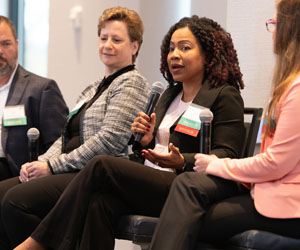What Is DEIB and Why Is It Needed in the Workplace?
November 01, 2022 Jena Frick
Diane Forbes Berthoud discussed how to build a diverse and equitable workplace based on talent, capabilities, and resources at the “Disruption! The Power of DEIB Strategies” conference.
On Oct. 26, I95 Business hosted a conference discussing diversity, equity, inclusion, and belonging (DEIB) strategies and the role they play in successful businesses and growing communities. The conference featured several conversational panels with powerful speakers and business leaders including the University of Maryland, Baltimore’s (UMB) Vice President and Chief Diversity Officer Diane Forbes Berthoud, PhD, MA.
Forbes Berthoud spoke on a panel about building an equitable and diverse working environment and finding more impactful ways to empower minorities in leadership. The panel included current and former executives from BGE and Citigroup.
“Research shows that diverse teams and organizations often have increased collaboration, more effective problem-solving, better decision-making, and overall improved morale and increased satisfaction,” stated Forbes Berthoud.
She further discussed this concept by defining DEIB using a comparison she made in an article she wrote that was recently published in Disruption! magazine. She described DEIB in the workplace as attending a dance. Diversity is being invited to the dance, inclusion is being asked to dance, belonging is when they play your song, and equity is having equal opportunity and resources, such as transportation, to go to the dance, regardless of your starting point.
Forbes Berthoud explained that UMB is continuing to build upon its efforts to create a welcoming and DEIB-focused workplace with specialized technology and programs. Since joining UMB, she has been leading the development of an internal platform that allows the University to review data on a wide range of organizational indicators, including retention, employee sentiment, promotion, and more based on race, ethnicity, sexual orientation, and gender. She described the dashboard and EDI leadership as part of a strategic, systematic, and sustainable approach to improve DEIB at UMB and providing a model for other universities to adopt.
“Ensuring equity means that we take into account structural factors and historical precedents and become curious about disparate outcomes for [underrepresented] groups and then adopt targeted measures to address these barriers and disparities,” she said. “We are all responsible for education and learning about this topic, as people are our greatest resource.”
Read Diane Forbes Berthoud’s article on Page 6 of the September 2022 issue of “Disruption!”.